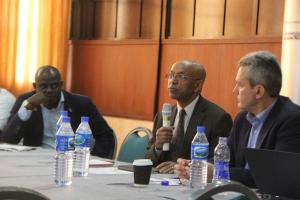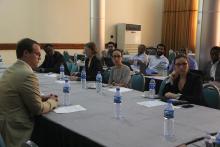Filling the gaps in healthcare services in conflict-affected North-east Nigeria
Maiduguri, 7 March 2018 - Malam Mohammed was desperate. His wife, Hannatu was in labour with their first child, but the nearest health facility was located 10 kilometres away and the only way to get there was on foot through rough terrain. The father to be lives in Pela Olla community, which is in a remote corner of Borno state in Nigeria.
Running out of options, Hannatu was steeling herself to deliver her baby without professional help.
“When I went into labour, I wasn’t sure of what the outcome would be since it was my first pregnancy and there was no nearby health facility or healthcare provider,” explained Hannatu.
Luckily for the couple, a World Health Organization (WHO) mobile health team was in the neighbourhood providing basic health care services. As soon as the team got a call from Malam they came to the couple’s house.
“The team helped me safely deliver my baby girl,” said Hannatu.
Hanatu is one of 800 000 people who have accessed integrated health interventions from the mobile health teams in 2017, which is one of WHO’s most innovative and successful programmes in the north-east Nigeria. Since 2016, the teams have been stepping in, filling a critical gap in the state’s health services. A nine-year conflict has led to the partial or complete destruction of two thirds of healthcare facilities in North-east Nigeria.
“The health system has been significantly disrupted and we are seeing a rise in outbreaks of preventable communicable diseases and inadequate care for patients,” said Dr. Wondimagegnehu Alemu, WHO Country Representative, Nigeria. “WHO has redoubled its efforts and is working with partners to providing health services to the people of North-east Nigeria.”
In 2017, WHO and partners reached nearly 4 million people with various healthcare services including emergency vaccinations against disease outbreaks of polio, measles and cholera, as well as malaria chemotherapy, malnutrition screening and reproductive healthcare. Routine vaccination of eligible children in security compromised areas, treatment of common childhood diseases through an integrated community-based health system as well as public health information campaigns were also carried out.
For the first time ever in Nigeria, WHO provided technical and financial support for the implementation of an oral cholera vaccination drive and seasonal malaria chemoprevention campaign in Borno state.
These interventions which contributed to mitigating disease outbreaks among vulnerable populations such as internally displaced persons, young children and women were jointly reviewed in Abuja recently. The Joint Operations Review which was held in Abuja from 27 February to 1 March with participants from WHO’s headquarters, regional office for Africa and Nigeria’s Country office, as well representatives from the United States Agency for International Development (USAID), European Commission Humanitarian Aid (ECHO), German and Norwegian embassies deliberated extensively on all aspects of WHO’s emergencies health programmes in north-east Nigeria including achievements, lessons learnt and challenges in 2017, as well as road map for reaching more people with healthcare services in 2018.
“This review of health operations in the north-east Nigeria is importantly timely as it provides ample opportunity to re-assess strategies and outcomes in delivering health interventions to the people affected by the insurgency in north-east Nigeria,” said Lindsay Dworman, USAID/DART Technical Assistant, European Commission Humanitarian Aid (ECHO).
In 2018, WHO will continue to expand coverage and quality of essential health services, while laying the foundation for longer-term. In collaboration with the Ministry of Health and partners, WHO plans to promote the expansion of essential package of health services including sexual and reproductive health, non-communicable diseases, trauma and secondary healthcare. The organization also plans to rehabilitate and equip some healthcare facilities, strengthen surveillance for disease outbreaks and take a strategic approach to strengthening the humanitarian development nexus.
Technical contact:
Dr Ifeanyi Okudo; Tel; 803 402 0833; Email: okudoi [at] who.int (okudoi[at]who[dot]int)




